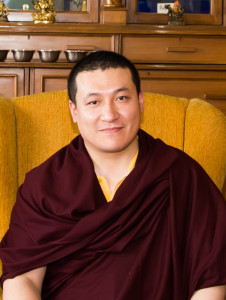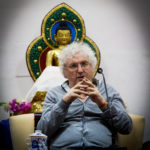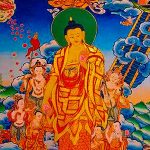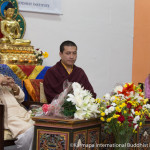H.H. Gyalwa Karmapa’s Introduction to KIBI’s 2015/2016 Academic Year
September 30, 2015

“I welcome you back once again for the KIBI Academic Course. I can see that many familiar faces are here once again. I hope all of you here are well. I heard that from tomorrow onwards you will be away (on a University trip to Rajasthan) for a few days, for some new experiences. I was asked by Khenpo Mriti to be here so that we could have some time together, and that I might share a few words about the importance of learning.
It cannot be stressed enough how important it is to learn, to absorb knowledge. The kind of platform, of environment that we have here in KIBI is something that was cultivated over the course of many, many years. And so now, finally, we have this opportunity to study here, so I am glad that students come to benefit from it. Additionally, this environment is not just to learn something for ourselves – it is more than that; as you learn from this place, you give yourself the opportunity to provide to others knowledge and information about Buddhadharma. In this day and age – although one could say that the fame and popularity of Buddhism is quite strong – a true understanding of what Buddhadharma means is still very scarce. Therefore, through this education, the main aim is not just to get a degree or to complete an academic course. Rather, the main aim is to have the right tools, the exact tools that you need in order to really absorb and understand what Buddhism is all about. In that way you will be able to help the multitude to understand what Buddhism is.
Although there may be many aspects concerning Buddhadharma – such as the traditional, ritualistic, philosophical aspects, and many more – Buddhism is nevertheless not confined within these frames. It is beyond that, in a way. So through taking the time to complete this type of course, you give yourself and others the opportunity to understand that. In short, from my personal understanding of what this is, these various aspects are a means to point towards what Buddha was talking about. Since each and every one of us come from different backgrounds and traditions, some of us might be more fascinated or captivated by the rituals, some of us by never-heard-before philosophical theories, and so on. Therefore, all these aspects are definitely needed and Buddha understood that. This is why, accordingly, he introduced the various vehicles or yanas.
After the parinirvana of Buddha, his followers continued to describe over and over again the same teaching but in various, different ways. For example, you find many great beings – like Arya Nagarjuna and Arya Asanga and so on – and these beings were not producing something totally new and completely different from what Buddha was saying. What they were trying to do was to say the same thing as Buddha, but according to their time and age, using the medium existing at the time.
The core of the teaching, from the way I understand it, is actually very, very simple. The reason why the real depth of Buddhism is somehow difficult to understand is because it is really simple. It is not at all the case that the true meaning of Buddhism is very complicated because it is mysterious and difficult to explain. Rather, it is complicated because it is so simple, too simple to convey to our complicated mind. That’s the thing: our mind, in general, is not complicated at all. It is very simple, very clear. In its nature, there is not any hope or fear, nor anything else, actually. To the point where, when we observe a toddler, we can see that their way of viewing the same world that we view is very, very simple. There is almost none of our fears and hopes in there at that time. Of course, as they grow up, they learn our complicated ways and make things more and more difficult. And now, when we try to capture something very simple, we are so used to relating to things in a very complicated way that we tell ourselves “It must be complicated!” Therefore, we believe that there must be something that we do not see. And so we use whichever means are available to find this mysterious thing. But since it is not complicated, we will not find it, because there was never anything complicated in the first place. And as a result of not finding anything complicated, we sort of confirm our doubt that there really must be something mysterious. Because we do not find anything, we make up something, a label, to apply on top of this doubt. This makes things very, very difficult.
And so, now that there are all these different aspects of the path, now that we have all these lists and summaries, such as the five skandhas (the five aggregates), the Four Noble Truths, and our rituals, and each and every bit of this and that…All these confirm our doubts that Buddhism is complicated! In doing so, there is a risk of losing one’s way and misinterpreting the path to the point where it becomes very individual. This does not help anyone. We end up confusing ourselves and others as well in this process.
After some time, we need to get back to reality, and as a result you go back to square one. And you feel that square one is far more real than anything else. That is the kind of scenario that is very much possible. We risk losing this precious path and this precious teaching that is still available to us.
Basically, it is almost unbelievable. The reason why it is simple is because it continuously points to cultivating compassion and wisdom. Nothing else, that’s it. But to our complicated mind, just hearing that is somehow not enough. It feels too common, too overrated. Therefore we tell ourselves that there must be something else, something more than that. But in fact, I don’t think so. I think that compassion and wisdom is really what the path is all about. Whether we spend many years in practice, or many years in meditation, the whole point is eventually to cultivate, gain, and preserve those two things.
Now if there is something complicated, if there is a challenge, then it is more about making sure not to lose sight of the simplicity of Buddhism. So this is what we have to understand and then convey to others. I have great hope that each and every one of you will be able to accomplish this. As I said, you have a very good platform here: you have competent teachers, competent supporters, and you have time and space and everything else that is needed. I would like to ask all of you to make the best use of it, and try your best. At least in the end, when you look back, you will have no regrets if you gave it your best shot. Give your best. And then, whether it sticks or not, that depends! But often it will stick.
Good luck, and thank you”.
Karmapa International Buddhist Institute
12.09.2015










